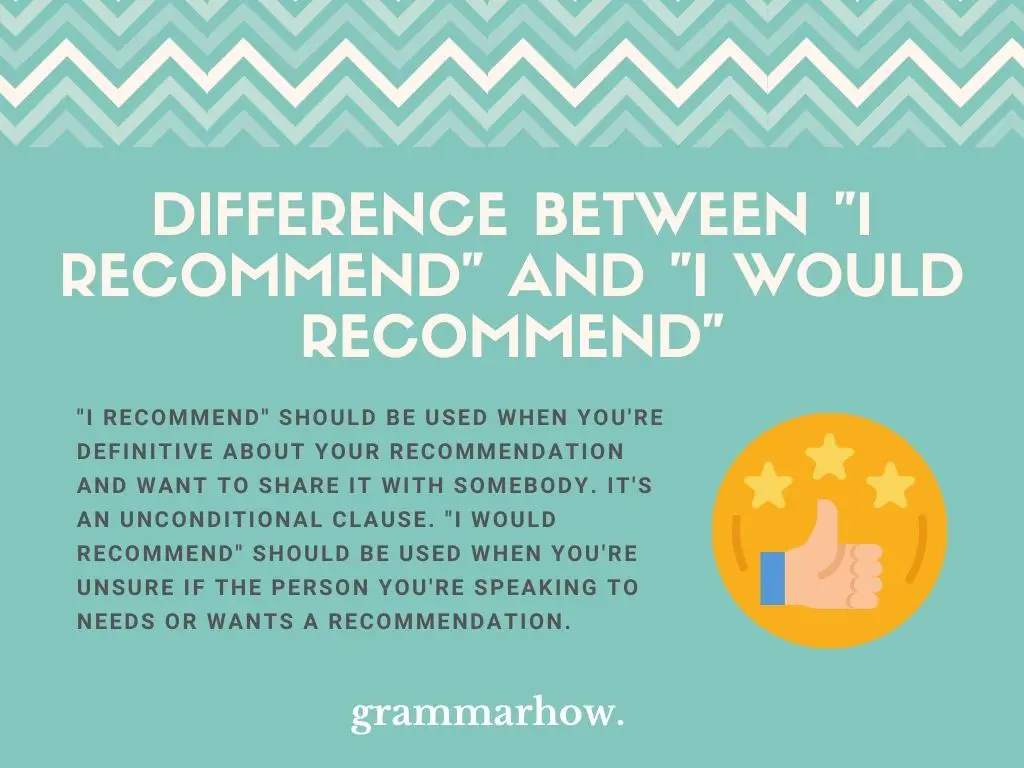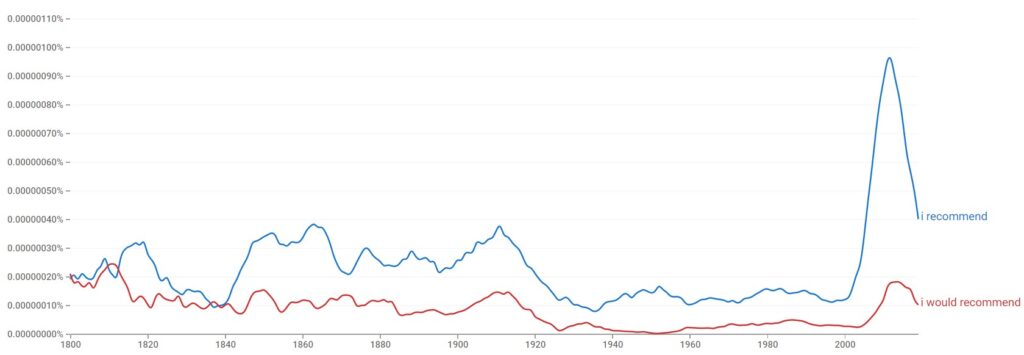We come across cases where phrases are slightly changed by introducing new words. Look at the difference between “I recommend” and “I would recommend,” for example. All because of one extra word, we use them in slightly different manners.
What Is The Difference Between “I Recommend” And “I Would Recommend”?
“I recommend” should be used when you’re definitive about your recommendation and want to share it with somebody. It’s an unconditional clause. “I would recommend” should be used when you’re unsure if the person you’re speaking to needs or wants a recommendation.

Even if someone isn’t necessarily looking for a recommendation, you might still feel like giving them one if you believe it to be beneficial to them. For this reason, we say “I would recommend” to encourage them to listen to us while also letting them know that we understand if they don’t want to.
Most native speakers tend to use the two phrases interchangeably, but this shouldn’t be the case. If you remember the distinct differences between the two, then you’ll have a much easier time using them in the right cases.
Is “I Recommend” Or “I Would Recommend” Used The Most?
We can take a look at the specific usage of each of the phrases to see which one is the most popular choice.
If we refer to the graph, we’ll see that “I recommend” is the most popular of the two phrases. It has always been more popular than “I would recommend” in the last century and shows that people are more confident to give a definite recommendation.

People don’t often like to be seen as “unsure” of anything. When we include the word “would” in the phrase, it often comes across as a slight lack of confidence, which otherwise wouldn’t be presented if we simply say “I recommend.”
Also, including “would” between the two words adds an extra (and often unnecessary word). Many people prefer to simplify the language they use to make it easier to say and write, which may be part of the reason why “I recommend” has always been more popular of the two.
Should You Use “To” After “Recommend”?
You don’t have to use any particular prepositions after the word “recommend,” though certain ones that you do use can change the meaning. If the meaning that it changes works for your situation, you may find that adding “to” after it helps you.
We say “recommend to” when we want to talk about making a recommendation to someone. However, “to” is often seen as an unnecessary word and is omitted to simplify the language.
- I recommend to get the shrimp.
- I recommend the shrimp.
- I recommend you to get the shrimp.
All of these examples above are correct. However, each one is dependent on who is speaking and which form they believe to be the most appropriate one for them.
The first one shows “recommend to” in the same place and is perhaps the least popular of the three choices. Generally, we’d replace “to get” with “getting” in that sentence and remove the word “to” entirely.
The second example removes “to get” but leaves the rest of the clause. This shows how “recommend” works well on its own without any prepositions and is the most common way to say and write it.
The third example shows the second most popular choice, where the word “you” (or any other pronoun) is put between “recommend” and “to.” It helps to break up the sentence in a nicer way and is easier to say.
Should You Use “For” After “Recommend”?
Everything we mentioned above can also be applied if we look at the preposition “for” and whether we use it after “recommend.”
We say “recommend for” when we want to put somebody forward for a reward or something similar (“I recommend him for a medal”). Generally, a pronoun must come between the two words.
- He is recommended for a medal.
- I will recommend him for a medal.
Both of these examples are correct and show the different tenses you can write. The first one shows “recommend for,” but we can only write it in this sense when we’re talking in the past tense and writing “recommended for.”
When we’re in the present tense, we must include a pronoun between the two words for it to work. “Him” is used in the second example to show this, and we can keep “recommend for” separate through this method.
7 Examples Of How To Use “I Recommend” In A Sentence
Now let’s go through some examples of how the phrase “I recommend” is used in a sentence. Remember, we use this when we’re more certain about something and want people to take our recommendations.
- I recommend you try the burger.
- I recommend you look for yourself.
- I recommend you don’t go that way.
- I recommend you attend all your lessons; otherwise, you’ll fall behind.
- You should listen to what I recommend.
- I recommend you go home and sleep it off.
- I recommend you go to the hospital to get it looked at.
As you can see, the examples we’ve shared here a more definitive. While we “recommend” our opinion, we use “I recommend” to show that we’re confident in our own opinion and want someone to listen to it.
Typically, good advice follows when someone starts a sentence with “I recommend.”
You never have to take their advice or recommendations into consideration if you don’t want to, though.
7 Examples Of How To Use “I Would Recommend” In A Sentence
Now let’s go over the slightly less confident phrase “I would recommend” and see how someone might use this in a sentence.
- I would recommend you get the chicken, but you might not like it.
- I would recommend listening to your teacher when you get a chance.
- I would recommend you don’t go over there, but you rarely listen to me.
- Why do you care what I would recommend?
- I would recommend you see a therapist to help you because I don’t know what to do.
- I would recommend eating at that restaurant, but I know you like different food to me.
- I would recommend visiting Spain on your next vacation.
From these examples, we can see how we typically add on an extra clause or sentence after saying “I would recommend.” Usually, this clause explains why we might not be so comfortable giving people our recommendations.
We may simply acknowledge that the person rarely listens to our advice, or we may be unsure whether our advice is even correct. Either way, if this is the case, that’s when it’s appropriate to use “I would recommend.”
“I Recommend” And “I Would Recommend” – Synonyms
Let’s go over a couple of synonyms and alternatives to see which words have the same meaning that can be used interchangeably. That’ll help expand your vocabulary list a little further.
- I approve
If you “approve” of something, it means you regard it very highly and encourage other people to try it as well, just like saying “I recommend.”
- I endorse
Just like “approve,” “endorse” means you think very highly of something and want everyone to understand why you like it so much by trying it themselves.
- I suggest
This one is most closely related to “I would recommend” because we’re merely putting a suggestion forward rather than stating a confident opinion. It can be seen as slightly less definitive in this manner.
Is It “I Would Recommend” Or “I Will Recommend”?
When we want to say the phrase, it’s important to remember to use “would” instead of “will.”
We use “I would recommend” because we’re talking to someone about our recommendation at that time. “I will recommend” implies we’re going to recommend something in the future, which doesn’t work in most situations.
- I would recommend the new restaurant in town.
- I will recommend that to them later.
As you can see, the first example shows us talking to someone about a suggestion we have. However, the second example refers to a future event that hasn’t happened yet.
Should You Use “Recommend” Or “Recommending”?
When you want to talk about what you suggest someone tries, it’s most appropriate to use “recommend.”
Recommend is the correct verb form to use when talking about what you suggest someone tries at the time. “Recommending” is the present participle, which is mostly used when talking about a future event, which rarely happens.
- I recommend you try the meatballs.
- I will be recommending the meatballs tonight.
Both of these examples are correct. However, “I recommend” here means we’re recommending something at the present moment, while “recommending” is used to say we’re suggesting something in the future.
Is It “I Would Recommend To Do” Or “I Would Recommend Doing”?
When we want to tell someone to do something through a recommendation, we must use the present participle after the verb form; otherwise, it won’t work.
“I would recommend doing” is the correct form to use because it follows the present participle language rules after using “would” and then “recommend” as a verb.
- I would recommend doing this!
- I would recommend to do this!
As you can see, only the first example is correct and is the only one we use.

Martin holds a Master’s degree in Finance and International Business. He has six years of experience in professional communication with clients, executives, and colleagues. Furthermore, he has teaching experience from Aarhus University. Martin has been featured as an expert in communication and teaching on Forbes and Shopify. Read more about Martin here.
